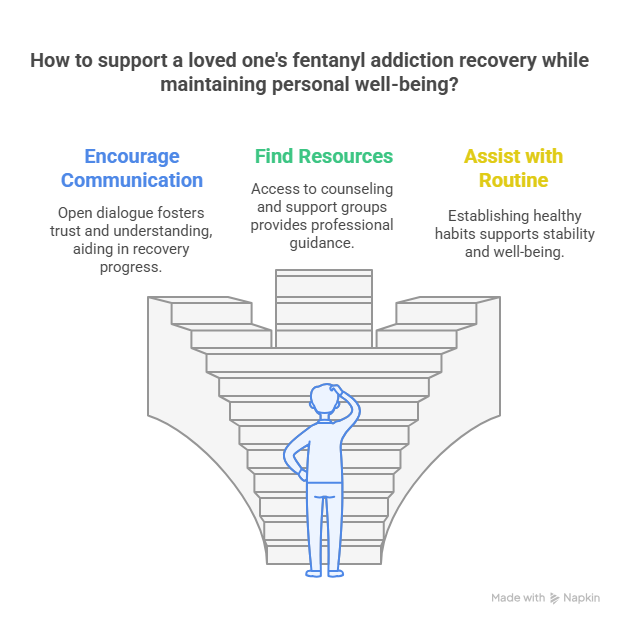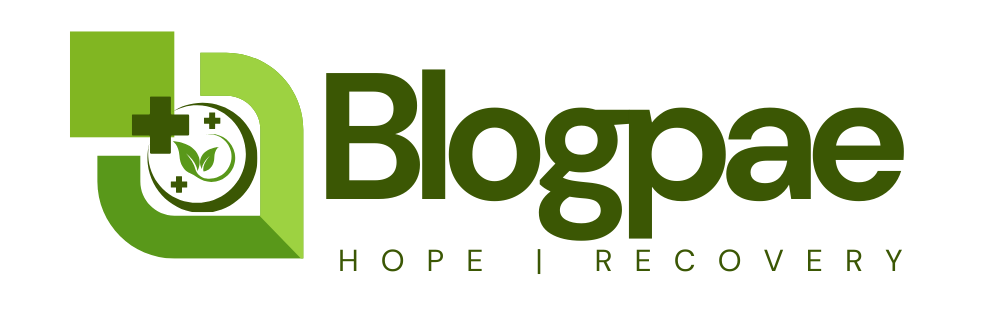Watching a loved one struggle with fentanyl addiction can be a harrowing experience. The opioid crisis has affected countless families across the United States, leaving many to wonder how to provide support without sacrificing their own well-being.
It’s crucial to approach this situation with empathy and understanding. Supporting a loved one through their addiction requires a delicate balance between being supportive and maintaining your own emotional and physical health.
This article aims to guide you through the process of helping your loved one overcome fentanyl addiction while ensuring you don’t lose yourself in the process.
Key Takeaways
- Understanding the nature of fentanyl addiction and its impact on families.
- Recognizing the importance of seeking professional help for your loved one.
- Learning effective ways to support your loved one without enabling their behavior.
- Prioritizing your own well-being and seeking support when needed.
- Navigating the challenges of supporting a loved one through recovery.
Understanding Fentanyl Addiction
Understanding fentanyl addiction is crucial for providing effective support to those struggling with it. Fentanyl is a highly potent synthetic opioid, 50 to 100 times more potent than morphine, which makes it extremely dangerous.
What Makes Fentanyl Particularly Dangerous
Fentanyl’s potency and rapid onset of action make it particularly dangerous. Even small amounts can be lethal, and its presence is often mixed with other substances, increasing the risk of overdose. Effective fentanyl addiction intervention strategies are critical to mitigate these risks.
Signs Your Loved One May Be Struggling with Fentanyl
Signs of fentanyl addiction include sudden changes in behavior, increased secrecy, and physical symptoms like drowsiness or confusion. Recognizing these signs early is vital for providing timely fentanyl addiction support. If you suspect someone is struggling, it’s essential to act with compassion and seek professional help.
How to Help Someone Addicted to Fentanyl: First Steps
Helping a loved one overcome fentanyl addiction requires a thoughtful and multi-step approach. It’s essential to be informed and prepared to support them effectively.
Starting the Conversation
Initiating a conversation about fentanyl addiction can be challenging, but it’s a crucial step. Choose a private, comfortable setting and express your concerns without being accusatory. Use “I” statements to convey your feelings and avoid blame.
Setting Healthy Boundaries
Establishing boundaries is vital for both your well-being and your loved one’s recovery. Clearly define what you’re willing and not willing to do. Consider creating a table to outline these boundaries:
| Boundary | Example | Benefit |
|---|---|---|
| Financial Support | Not providing money for drugs | Encourages seeking treatment |
| Emotional Support | Being available for therapy sessions | Enhances recovery support |
| Personal Space | Having alone time when needed | Reduces caregiver burnout |
Intervention Strategies That Work
When dealing with fentanyl addiction, the right intervention strategy can make all the difference. Intervention is a crucial step towards helping your loved one overcome their addiction and begin the journey towards recovery.
Professional vs. Family Interventions
Interventions can be conducted either by professionals or by family members. Professional interventions are led by experienced counselors who understand the complexities of addiction. They can provide a structured and safe environment for the intervention.
On the other hand, family interventions, while potentially more emotionally charged, can be highly effective if done correctly. It’s essential to approach these interventions with care, ensuring that the message is conveyed without causing additional distress.
| Intervention Type | Advantages | Disadvantages |
|---|---|---|
| Professional | Structured, expert guidance | May lack personal touch |
| Family | Emotionally engaging, personal | Risk of being confrontational |
What to Say (and What Not to Say)
When intervening, it’s crucial to communicate effectively. Avoid being confrontational or accusatory, as this can exacerbate the situation. Instead, focus on expressing your concern and the reasons behind your intervention.
“The most important thing you can do is to express your love and concern for the addict in a non-judgmental way.”
Use “I” statements to convey your feelings and avoid blaming language. For example, “I feel worried when I see you struggling” rather than “You’re always struggling.”
Treatment Options for Fentanyl Addiction
Fentanyl addiction treatment encompasses a range of approaches, from medical detox to rehabilitation programs. Effective recovery often involves a combination of these treatments tailored to the individual’s needs.
Medical Detox Programs
Medical detox programs provide a safe environment for individuals to withdraw from fentanyl under medical supervision. These programs manage withdrawal symptoms and reduce the risk of complications. Medically supervised detox is crucial for minimizing the discomfort and risks associated with fentanyl withdrawal.
Inpatient and Outpatient Rehabilitation
Inpatient rehabilitation offers intensive, round-the-clock care in a residential setting, while outpatient programs allow individuals to receive treatment while living at home. Both types of rehabilitation programs provide counseling, therapy, and support to help individuals achieve long-term recovery.
| Treatment Type | Description | Benefits |
|---|---|---|
| Medical Detox | Supervised withdrawal from fentanyl | Manages withdrawal symptoms, reduces complications |
| Inpatient Rehab | Residential treatment with intensive care | Provides immersive therapy and support |
| Outpatient Rehab | Flexible treatment for those living at home | Allows for continued daily responsibilities |
Medication-Assisted Treatment
Medication-assisted treatment (MAT) combines medications like methadone or buprenorphine with counseling and therapy. MAT helps manage cravings and withdrawal symptoms, supporting long-term recovery.
By understanding these treatment options, individuals and their loved ones can make informed decisions about the best path to recovery from fentanyl addiction.
Supporting Recovery While Maintaining Your Well-being
Supporting a loved one through fentanyl addiction recovery can be challenging, but it’s equally important to prioritize your own well-being during this process. The journey to recovery is long and requires a balanced approach that considers both the individual’s needs and the support system’s health.
Practical Ways to Offer Support
There are several ways to support a loved one recovering from fentanyl addiction. Encouraging open communication about their recovery progress and challenges can be very helpful. You can also support them by:
- Helping them find fentanyl addiction recovery resources, such as counseling or support groups.
- Assisting them in creating a daily routine that includes healthy habits and activities.
- Being present at important recovery milestones and celebrations.
Additionally, educating yourself about fentanyl addiction and the recovery process can make you a more effective and empathetic supporter.

Recognizing and Avoiding Enabling Behaviors
While it’s natural to want to help your loved one, it’s crucial to distinguish between supportive behaviors and enabling behaviors. Enabling can inadvertently hinder the recovery process by removing the consequences of addictive behavior. To avoid enabling, consider the following tips:
- Do not provide financial support that could be used to obtain drugs.
- Avoid making excuses or covering up for their behavior.
- Encourage them to take responsibility for their recovery and daily tasks.
By being aware of these dynamics, you can provide fentanyl addiction recovery tips that genuinely support their journey towards a healthier life.
Self-Care Strategies for Supporters
As a supporter of someone dealing with fentanyl addiction, prioritizing your own well-being is not selfish, it’s necessary. The emotional toll of caring for a loved one struggling with addiction can be overwhelming, making self-care strategies essential for maintaining your mental and physical health.
Finding Your Own Support Network
Having a support network can significantly alleviate the stress and emotional burden of supporting someone with fentanyl addiction. Support groups for families and friends of individuals struggling with addiction can provide a safe space to share experiences and gain insights from others facing similar challenges.
Additionally, consider seeking professional help, such as therapy or counseling, to address any emotional or psychological strain you’re experiencing. Individual therapy can offer a personalized approach to coping with the stress of supporting a loved one.
| Support Network Options | Description | Benefits |
|---|---|---|
| Support Groups | Groups for families and friends of individuals with addiction | Shared experiences, emotional support, and practical advice |
| Individual Therapy | Personalized counseling for supporters | Emotional relief, coping strategies, and mental health support |
| Online Communities | Online forums and groups for supporters | Accessibility, anonymity, and a wide range of shared experiences |
Setting Boundaries and Managing Expectations
Setting clear boundaries is crucial for maintaining your well-being while supporting a loved one with fentanyl addiction. Establishing what you can and cannot do helps prevent burnout and ensures you can continue to provide support.
Managing your expectations is also vital. Understand that recovery is a long-term process with potential setbacks. Being prepared for the challenges ahead can help you stay resilient.
Conclusion
Helping a loved one overcome fentanyl addiction requires a comprehensive and compassionate approach. By understanding the nature of fentanyl addiction and its dangers, you can better support your loved one. Starting with an open and honest conversation, setting healthy boundaries, and seeking professional help are crucial steps in their recovery journey.
Effective intervention strategies, including professional interventions and careful communication, can encourage your loved one to seek help for their fentanyl addiction. Exploring various treatment options such as medical detox programs, inpatient and outpatient rehabilitation, and medication-assisted treatment can provide them with the best chance of recovery. Providing ongoing support while maintaining your own well-being is vital for their long-term success.
By being informed and supportive, you can make a significant difference in your loved one’s recovery from fentanyl addiction. Seeking help for loved ones addicted to fentanyl is a journey that requires patience, understanding, and the right resources. With fentanyl addiction support, your loved one can navigate the challenges of recovery and work towards a healthier, addiction-free life.
FAQ
What are the first steps to take when helping someone addicted to fentanyl?
The first steps involve starting a conversation with your loved one about their addiction, setting healthy boundaries, and seeking professional guidance to understand the best course of action for their specific situation.
How can I support a loved one in fentanyl addiction recovery?
Supporting a loved one in recovery involves offering practical help, such as driving them to treatment appointments, being a listening ear, and encouraging their progress while avoiding enabling behaviors that could hinder their recovery.
What are the signs that someone is struggling with fentanyl addiction?
Signs of fentanyl addiction can include sudden changes in behavior, such as increased secrecy, changes in appetite or sleep patterns, and physical signs like drowsiness or confusion. You might also notice them needing more money or exhibiting withdrawal symptoms when they can’t access the drug.
What treatment options are available for fentanyl addiction?
Treatment options for fentanyl addiction include medical detox programs to safely manage withdrawal, inpatient and outpatient rehabilitation programs to address the underlying causes of addiction, and medication-assisted treatment to help manage cravings and withdrawal symptoms.
How can I maintain my own well-being while supporting a loved one with fentanyl addiction?
Maintaining your well-being involves setting boundaries, seeking support from friends, family, or support groups, and engaging in self-care activities to manage the stress and emotional toll of supporting a loved one through their recovery.
What is the difference between professional and family interventions for fentanyl addiction?
Professional interventions are led by a trained interventionist and can provide a structured and supportive environment for encouraging a loved one to seek treatment. Family interventions, while potentially effective, can sometimes be more emotionally charged and may benefit from professional guidance to ensure they are conducted constructively.
How can I recognize and avoid enabling behaviors?
Enabling behaviors include actions like providing financial support that is used to purchase drugs, making excuses for a loved one’s behavior, or covering up the consequences of their addiction. Avoiding these behaviors involves setting clear boundaries and encouraging your loved one to take responsibility for their recovery.
What are some effective intervention strategies for fentanyl addiction?
Effective intervention strategies include expressing your concerns in a non-judgmental way, highlighting the specific ways in which their addiction has affected them and your relationship, and presenting a treatment plan that your loved one can follow.
Where can I find support for myself as a supporter of someone with fentanyl addiction?
You can find support through organizations that specialize in substance abuse, such as Nar-Anon or the National Alliance on Mental Illness (NAMI), which offer resources, support groups, and guidance for families and loved ones of individuals struggling with addiction.
What self-care strategies are helpful for supporters of loved ones with fentanyl addiction?
Helpful self-care strategies include finding a support network of peers who understand your situation, setting realistic boundaries and expectations, and engaging in activities that promote your physical and emotional well-being.
Reference




